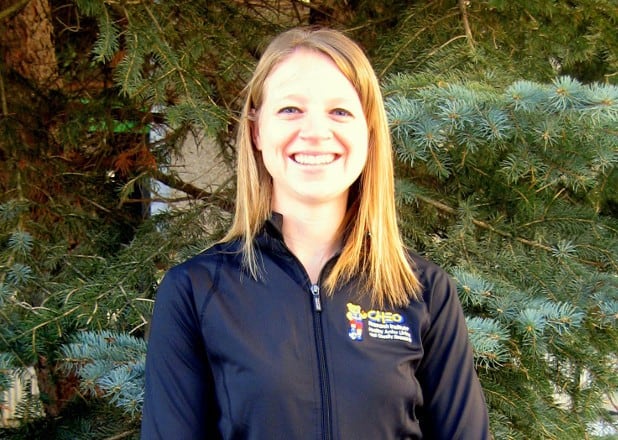Dr. Veronica Poitras
Research Manager
Degrees
- BSc Queen’s University – Life Sciences
- BPHE Queen’s University
- MSc Queen’s University – Kinesiology and Health Studies (Cardiovascular Physiology)
- PhD Queen’s University – Kinesiology and Health Studies (Cardiovascular Physiology)
Mini Biography
Dr. Veronica Poitras completed her PhD in Kinesiology at Queen’s University in September of 2014. Her graduate work focused on: 1) the impact of lifestyle factors (psychosocial stress and consumption of a high-fat diet) on cardiovascular health and function, and 2) the cardiovascular consequences of type 2 diabetes and the preliminary development of an intervention to enhance exercise tolerance in this population. She joined HALO in December 2014 as part of the team working to develop the world’s first “24-Hour Movement Guidelines for Children and Youth”. This project is based on the appreciation that all behaviours along the movement continuum (from sleep and sedentary behaviours to vigorous intensity physical activity) interact with one another with respect to health, and ultimately aims to improve the overall well-being of children and youth. She is also involved in a number of initiatives aimed at advancing physical activity in children and youth in Canada and around the world (e.g., with the Active Canada 20/20 Active Play Action Group, and the Active Healthy Kids Global Alliance). Outside of work, Veronica loves spending time in the Great Outdoors. She enjoys cycling, hiking, snowshoeing, group exercise/fitness classes, reading, baking/cooking, and spending time with family and friends.
Publications
- Poitras VJ, Slattery DJ, Gurd BJ, and Pyke KE. Evidence that meal fat content does not impact hemodynamic reactivity to or recovery from repeated mental stress tasks. Appl. Physiol. Nutr. Metab. 39(11): 1314-21, 2014.
- Bentley R, Kellawan J, Moynes J, Poitras V, Walsh J, and Tschakovsky M. Individual susceptibility to hypoperfusion and reductions in exercise performance when perfusion pressure is reduced: evidence for vasodilator phenotypes. J. Appl. Physiol. 117(4): 392-405, 2014.
- Poitras VJ, Slattery DJ, Levac BM, Fergus S, Gurd BJ, and Pyke KE. The combined influence of fat consumption and repeated mental stress on brachial artery flow mediated dilation: a preliminary study. Exp. Physiol. 99: 715-728, 2014.
- Szijgyarto IC, Poitras VJ, Gurd BJ, and Pyke KE. Acute psychological and physical stress transiently enhances brachial artery flow-mediated dilation stimulated by exercise induced increases in shear stress. Appl. Physiol. Nutr. Metab. 39(8): 927-36, 2014.
- Poitras VJ and Pyke KE. The impact of acute mental stress on vascular endothelial function: Evidence, mechanisms and importance. International Journal of Psychophysiology 88:124-135, 2013.
- Szijgyarto IC, King TJ, Ku J, Poitras V, Gurd BJ, and Pyke KE. The impact of acute mental stress on brachial artery flow mediated dilation differs when shear stress is elevated by reactive hyperemia vs. handgrip exercise. Appl. Physiol. Nutr. Metab. 38: 498-506, 2012.
- Wiltshire EV, Poitras V, Pak M, Hong T, Rayner J, and Tschakovsky ME. Massage impairs postexercise muscle blood flow and “lactic acid” removal. Med. Sci. Sports Exerc. 42: 1062-1071, 2010.
- Pyke KE, Poitras V, and Tschakovsky ME. Brachial artery flow-mediated dilation during handgrip exercise: evidence for endothelial transduction of the mean shear stimulus. Am. J. Physiol Heart Circ. Physiol 294: H2669-H2679, 2008.

